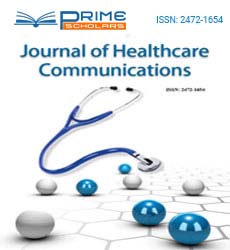Perspective - (2023) Volume 8, Issue 6
Navigating the Landscape of Diabetes Care: A Holistic Approach to Management
Maria Hanson*
Department of Foundations of Medicine, New York University, USA
*Correspondence:
Maria Hanson,
Department of Foundations of Medicine, New York University,
USA,
Email:
Received: 29-Nov-2023, Manuscript No. IPJHCC-24-18794;
Editor assigned: 01-Dec-2023, Pre QC No. IPJHCC-24-18794 (PQ);
Reviewed: 15-Dec-2023, QC No. IPJHCC-24-18794;
Revised: 20-Dec-2023, Manuscript No. IPJHCC-24-18794 (R);
Published:
27-Dec-2023, DOI: 10.36846/2472-1654-8.6.8058
Introduction
Diabetes, a chronic metabolic disorder characterized by
elevated blood glucose levels, has emerged as a global health
challenge with a significant impact on individuals, healthcare
systems, and societies. As the prevalence of diabetes continues
to rise, effective diabetes care becomes increasingly crucial in
preventing complications and improving the quality of life for
those affected. In this commentary, we explore the multifaceted
dimensions of diabetes care, emphasizing the importance of a
holistic approach that encompasses prevention, management,
and patient education.
Description
Prevention serves as the cornerstone of diabetes care,
underlining the significance of lifestyle modifications and
public health initiatives. The surge in type 2 diabetes, often
associated with sedentary lifestyles and unhealthy dietary
habits, underscores the need for proactive measures.
Encouraging physical activity, promoting a balanced diet,
and fostering awareness about the risk factors contribute
to primary prevention. Furthermore, screening programs
play a pivotal role in identifying individuals at risk, enabling
early intervention. Health campaigns that emphasize the
importance of regular check-ups and highlight the link between
obesity, poor dietary choices, and diabetes risk can empower
individuals to make informed choices regarding their health.
For those already diagnosed, effective diabetes management
involves a comprehensive approach that extends beyond
medications. Tailored treatment plans, which may include
medication, insulin therapy, or other interventions, should be
designed based on individual needs, considering factors such
as age, comorbidities, and lifestyle. Blood glucose monitoring
remains a crucial component of diabetes management.
Technological advancements have introduced continuous
glucose monitoring (CGM) systems that provide real-time data,
offering patients and healthcare providers a more nuanced
understanding of blood glucose fluctuations. Such innovations
not only enhance precision in treatment but also empower
individuals to take an active role in managing their condition.
Additionally, a multidisciplinary approach is essential, involving
healthcare professionals such as endocrinologists, dietitians,
and diabetes educators. Collaborative efforts allow for a
holistic assessment of the patient’s well-being, addressing not
only glycemic control but also associated cardiovascular risks,
mental health concerns, and lifestyle factors. Empowering
individuals with diabetes through education is paramount for
fostering self-management and reducing the burden of the
disease. Education should encompass various aspects, including
understanding the importance of medication adherence,
monitoring blood glucose levels, and recognizing signs of
complications. Promoting a patient-centric model encourages
shared decision-making between healthcare providers and
individuals with diabetes. This approach recognizes the unique
experiences and challenges faced by each patient, allowing for
more personalized and effective care plans. Diabetes education
should also extend to family members, as a supportive
environment greatly influences the patient’s ability to manage
their condition successfully.
Conclusion
In navigating the landscape of diabetes care, a holistic approach
that spans prevention, comprehensive management, patient
education, and psychosocial support is essential. Embracing
the interconnected nature of these components ensures a
more effective and sustainable response to the challenges
posed by diabetes. As healthcare systems evolve, the emphasis
on preventive strategies, personalized care, and patient
empowerment will continue to shape the future of diabetes
care, ultimately striving for improved health outcomes and
enhanced quality of life for individuals living with diabetes.
Citation: Hanson M (2023) Navigating the Landscape of Diabetes Care: A Holistic Approach to Management. J Healthc Commun. 8:8058.
Copyright: © 2023 Hanson M. This is an open-access article distributed under the terms of the Creative Commons Attribution License, which permits unrestricted use, distribution, and reproduction in any medium, provided the original author and source are credited.

